EDITOR’S NOTE: Spacing occasionally includes posts from our friend Christopher DeWolf in Montréal. If you’re a fan of our rival city up the 401, you’ll be able to read more its public space issues quite soon. Details to follow.
– – – – – – – – – – – – – – –
Every year, I head down to Just for Laughs. Not for the comedy, but for the festival site, which takes over the entire Latin Quarter and makes brilliant use of its meandering laneways and hidden corners. For two weeks in July, the Latin Quarter becomes a mysterious village, an amiable place where crowds wander through a surreal landscape of street theatre and shadows. Outdoor cafés, bars and stages emerge in the normally quiet alleys behind St. Denis Street. Space that is normally left to cars and garbage is given over to the crowds.
Just for Laughs reveals the potential of the Latin Quarter’s urban space. The network of Victorian-era laneways that crisscrosses the neighbourhood — Joly Avenue, Terrasse St. Denis, Savoie Avenue and Place Paul-à‰mile-Borduas — is one of Montreal’s best-kept secrets. So why haven’t these laneways been turned into bona fide public spaces? Where are the trees, the benches, the quiet plazas in which you sit reading on a hot summer afternoon?
(Over the past couple of months, two of these alleys have been redeveloped. Place Borduas and Savoie Avenue, both of which lead to the Grande Bibliothà¨que, have been resurfaced with granite paving stones, though I have yet to see any benches or other types of street furniture. For the most part, the potential of these hidden streets is being squandered.)
Just for Laughs might be an exercise in urban imagination but, like too many of Montreal’s other large festivals, it is also an exercise in urban intimidation. While I am happy to see the Latin Quarter reimagined every summer, I am less thrilled to witness the temporary privatization of an entire city neighbourhood. Just for Laughs opens the streets and alleys of the Latin Quarter to the public, but it does so in the same manner as an amusement park. Access and behaviour is restricted: the festival’s security staff has the right to bar anyone from the festival site, even if it exists on public space.
For most people, this is no problem. They open their bags for a brief visual inspection and head merrily on their way. But what about those who live within the area taken over by Just for Laughs? Last week, La Presse reported that the roughly 1,700 residents of the Habitations Jeanne-Mance, a diverse public housing project that is home to a large Bengali community, must wear special badges in order to gain access to their own homes. Some residents, especially elderly ones who must navigate around barriers to get to their apartment block, have complained, adding to a long-standing list of grievances that includes excessive noise.
The question of how to manage a festival’s impact on its surrounding neighbourhood is a complicated one. I’m not prepared to offer any easy answers. But I do think that Montreal can learn from Just for Laughs’ innovative use of urban space while avoiding the kind of semi-privatization of public space it entails. In its own strange way, Just for Laugh shows us how to make good use of the Latin Quarter while reminding us not to exclude the broader community, including the residents of the Habitations Jeanne-Mance next door.
Joly Avenue is taken over by pedestrians. Stages, concessions and open-air bars have been set up in the alley.

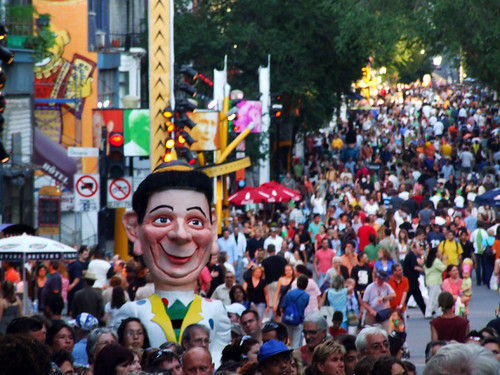
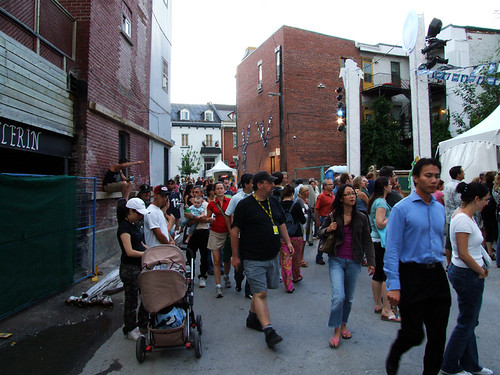
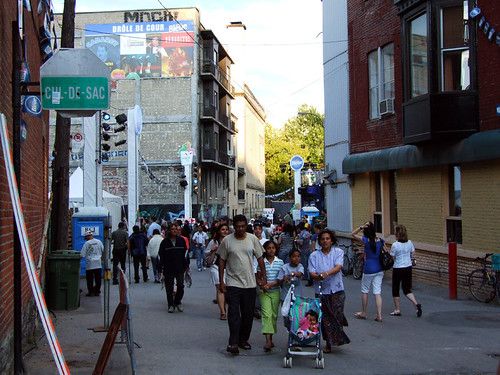
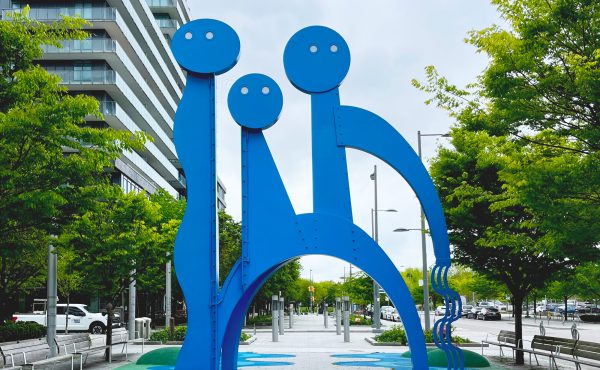
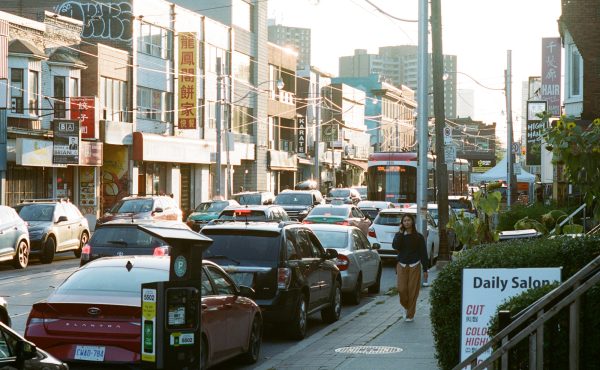
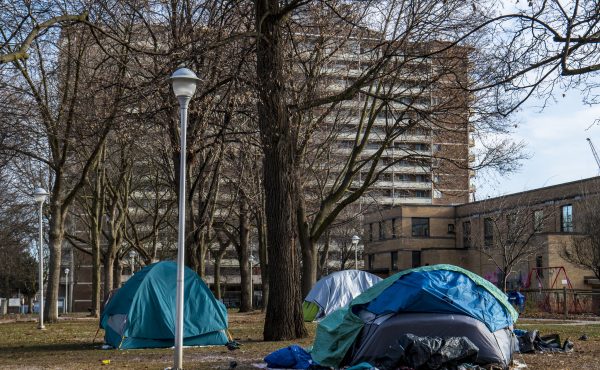
8 comments
The Jeanne Mance thing is one of those ridiculous subsidized housing things and it’s full of all sorts of people. Is Chris suggesting that Bangladeshis are welfare mooches? That big dump is home not to any one ethnic group, but to all the chumps and loons who are stuck at the bottom.
Great post. Montreal’s street festivals are more interesting than Toronto’s, because of the difference approaches each city took towards planning (and when each city was built/boomed).
Don’t know why Bill (above comment) is chastising Mr DeWolf. He seems to have his own issues to sort through.
As a 7-year resident of Montreal, the Just For Laughs Festival is something I want to avoid at all costs — unless I want to feel like CATTLE!!!
Whenever I want to feel like a HUMAN BEING I flee Montreal because it has become a nightmare in the summertime. There are no less than 10 major events of the JFL kind in the downtown area, in a 45-day period, starting with the F1 extravaganza in early June all the way to the gay bash in August. The weekly fireworks display sound like Beirut under Israeli fighter jets, even if you’re 5km away. Not to mention the soccer dudes honking for hours when Portugal or Italy wins the quarter final of some overseas tournament.
Journalists at Le Devoir newspaper coined the “hyperfestivity” term to describe the phenomenon. My own definition is: “crack cocaine for the masses”.
I wish (financial) DEATH to all corporate welfare bums like Gilbert Rozon and the Jazz Fest idiots, who’ve taken over the entire city to the benefit of suburban SUV drivers, sell us Coors Light at 6$ in a plastic glass and pretend they represent Quebec culture.
I don’t know much about Montreal but from what I understand in the comments is that this Habitations Jeanne Mance is a government subsidized housing project. If that’s the case then the authorities are entitled to check the identification of the people whose rent they’re paying.
Roger> That entitlement is listed in the constitution somewhere? Crazy Trudeau probably slipped it in somewhere.
Pierre> Poor Pierre! That sounds like big cities everywhere — you have to deal with things. During the film festival here in Toronto I sometimes want to leave — or just avoid Yorkville. But that’s the give and take of living in a big place. You can live a few streets away and it largely doesn’t affect you though. Unless you live right on St. Laurent or St. Catherine.
Hey Roger – The idea that the government is entitled to check the ID of people who live in subsidized housing is completely ridiculous. To begin with, that mentality is the one that lies behind all of our various governments’ poor-bashing policies, which treat the poor as second-class citizens just because they are in situations that others have been simply lucky enough to avoid. Just because there’s some festival going on, the people who live in Jeanne Mance should all of a sudden be asked to sacrifice their privacy rights? Like Shawn, I must have missed that the last time I looked through the Charter. Secondly, I’m willing to bet it wasn’t the “government” checking people’s IDs, but some private rent-a-cop force or else festival security staff — in other words, a private corporation. Third, all of us use subsidized services EVERY SINGLE DAY. Try getting around without walking on the sidewalk, taking transit, or driving on a road. Oops – thirsty? Why not try a nice glass of tap water — uh oh, wait a second — riiiiiight… governments pay the lion’s share of water services, infrastructure and distribution costs. Surely we can at least use the computer to write web-posts attacking poor people…. better get on the treadmill, though, and generate some electricity… wouldn’t want to use the hydro coming through the wall for which we pay only a fraction of the real cost. Hope you’re not sick or anything – you might have to go to hospital, in an ambulance. On your way to school, primary, secondary or post-secondary — I guess most students, for whom the government pays anywhere from 100% to 33% of the costs, had better get ready for the police to start checking their IDs (of course, this happens a lot already in high schools). All of this, of course, is paid for out of taxes, which all of us pay in one form or another and from which all of us are entitled to benefit. That’s one of the points of living together in a society. And when you’ve had the misfortune to land on the bottom rungs, you get a break on much of those taxes and, if you’re lucky, some additional benefits which will barely help you to scrape by. In exchange for this, you shouldn’t be asked to give up any of the rights that everyone else has.
In the case of the actual event, they’ve used special IDs as a way to distinguish residents from everyone else, so that they can avoid the security checks (La Presse). Maybe that’s the best solution, I’m not sure. But I understand it is done equally to all residents of the festival zone. Disappointing, no doubt, to those who would rather just single out poor people for the “papers, please” kind of treatment year round.
Wow! This post is linked to mine about the JazzFest and public space use! Feel free to read (English below, translation for late post coming soon!) @
http://lynnecw.francofun.ca/2007/07/01/gentrification-maxima-festival-de-jazz/